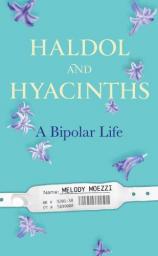Reading Group Guide
Discussion Questions
Haldol and Hyacinths

1. Do you or does anyone you know suffer from bipolar disorder? If so, how well does Melody capture what it’s like?
2. If you are a psychiatrist, psychologist, or employed in the field of mental health, did Melody’s experiences change your perspective on the patients in your care?
3. Do you or does anyone you know take psychopharmaceuticals? Have you noticed a discernable difference in your own or another person’s behavior on or off the drugs?
4. As a consumer, do you feel that drug companies provide adequate warning about a medication’s possible side effects?
5. Do you regard mental illness as something shameful or as a treatable malady? What do you feel shaped your opinion?
6. The intake counselor at Stillbrook tells Melody, “I realize that humor is a coping mechanism for you. It can be helpful sometimes, but it can also be distracting and destructive” (p. 34). How well does Melody use humor to tell her story?
7. In addition to Iranians, many other groups feel that there is a stigma attached to mental illness and are consequently less likely to seek out help. What might be done to ease their fears?
8. Were you familiar with either Melody’s political commentary or her earlier book, War on Error, before reading Haldol and Hyacinths? If so, were you surprised to learn that she struggles with bipolar disorder?
9. Melody laments the fact that the mentally ill “have no especially loud and high-profile advocates…. No pink boas or bracelets or ribbons or T-shirts” (p. 5). Why—at a time when an increasing number of people are taking psycho-pharmaceuticals—aren’t celebrities and other public figures more open about their own battles with mental illness?
10. Are books like Prozac Diary, Noonday Demon, and now Haldol and Hyacinths helping to demystify mental illness? How have attitudes toward mental illness changed since Melody was a girl in the 1980s?
11. While Melody dealt with the physical side of anorexia as a result of her pancreatic tumor and the pain she experienced after eating, she also became familiar with the psychological side when others began praising her for unnecessary weight loss due to her illness. While Melody overcame her struggles with anorexia after her tumor was removed, many others have not. Have you ever complimented someone on her or his weight loss and later learned that it was due to an eating disorder or other illness? Do you agree with Melody when she writes that “In twenty-first-century America at least, there’s no more than a five-pound difference between [pretty and scary]”? (p. 63)
12. Melody writes that she “used to believe that all crazy people had a hint of genius in them—or at least a handful of extraordinary insights” (p. 260). Why does our cultural stereotype of mental illness imagine that it walks hand-in-hand with genius or creativity? Does this perception affect the way we treat the mentally ill?
Haldol and Hyacinths
- Publication Date: August 1, 2013
- Hardcover: 304 pages
- Publisher: Avery
- ISBN-10: 1583334688
- ISBN-13: 9781583334683







